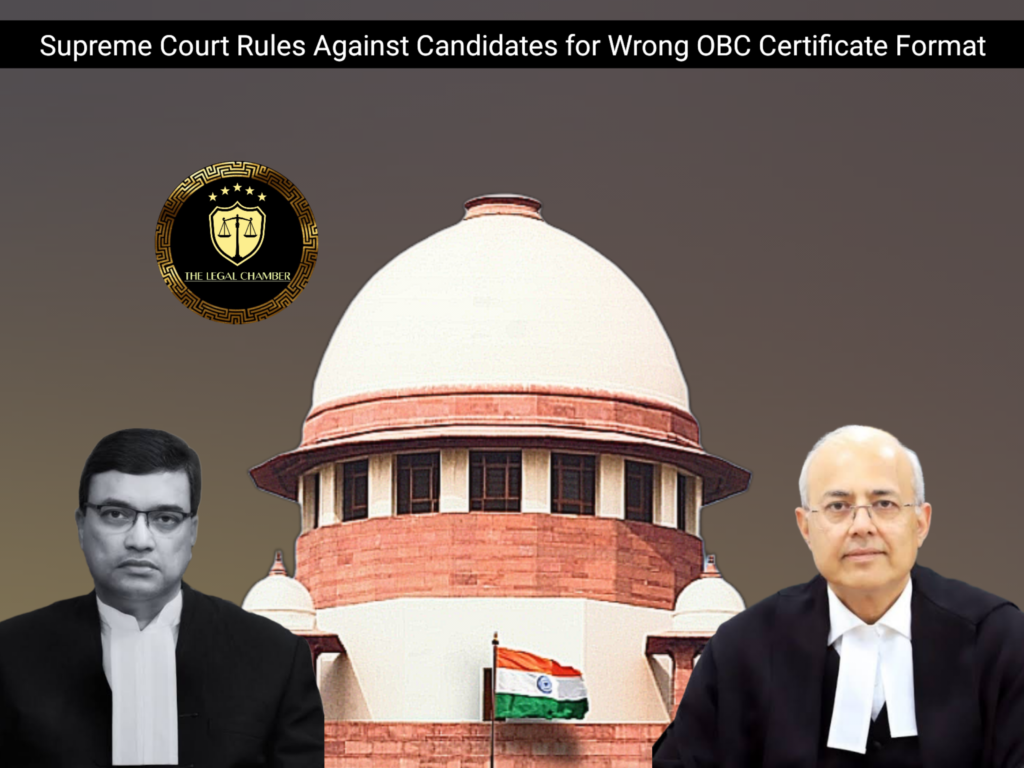
The Supreme Court upheld the Uttar Pradesh Police Recruitment Board’s decision to reject OBC certificates not submitted in the prescribed state format, ruling that compliance with recruitment notification terms is mandatory. The Court emphasized that candidates must adhere to specified requirements and cannot claim relaxation if they fail to meet procedural conditions. Non-compliance disqualifies them from reservation benefits, as the state’s format ensures verification of creamy layer exclusion. The judgment reinforced that recruitment rules must be strictly followed, and courts should not interfere unless constitutional violations are established.
Facts Of The Case:
The case involved two civil appeals arising from separate writ petitions challenging the Uttar Pradesh Police Recruitment and Promotion Board’s (UPPRPB) rejection of OBC certificates submitted by candidates Mohit Kumar and Kiran Prajapati. The recruitment notification for Sub-Inspector and Platoon Commander posts mandated that OBC candidates submit caste certificates in a prescribed state format (Format-I), which included income and wealth criteria to exclude the “creamy layer.” Both Mohit and Kiran submitted OBC certificates issued in the Central Government’s format instead of the state-prescribed one. Consequently, UPPRPB treated them as general category candidates, and since their marks fell below the general cut-off (but above the OBC cut-off), they were not selected.
Mohit challenged the rejection before the Allahabad High Court, which dismissed his petition, while Kiran’s petition was allowed, directing UPPRPB to accept her certificate. The conflicting High Court orders led to appeals before the Supreme Court. The State argued that the prescribed format ensured compliance with state-specific creamy layer criteria, while the candidates contended that their certificates were valid and technicalities should not deny them reservation benefits. The Supreme Court ruled in favor of the State, holding that strict adherence to recruitment rules was mandatory, and candidates could not seek relaxation for non-compliance. The judgment upheld UPPRPB’s decision, dismissing Mohit’s appeal and allowing the State’s appeal against Kiran.
Procedural History:
The procedural history of the case began when Mohit Kumar and Kiran Prajapati, unsuccessful candidates in the Uttar Pradesh Police Sub-Inspector recruitment, challenged the UPPRPB’s rejection of their OBC certificates before the Allahabad High Court through separate writ petitions. Mohit’s petition (Writ-A No. 11413 of 2022) was dismissed by the High Court on 22nd March 2023, upholding UPPRPB’s decision to treat him as a general category candidate due to non-submission of the state-prescribed OBC certificate. In contrast, Kiran’s petition (Writ-A No. 5245 of 2023) was allowed by a single judge on 27th March 2023, directing UPPRPB to accept her certificate, a decision later confirmed by a Division Bench on 25th August 2023 in Special Appeal Defective No. 562 of 2023.
The divergent High Court outcomes led to two appeals before the Supreme Court – Civil Appeal No. 5233 of 2025 (Mohit’s challenge to his dismissal) and Civil Appeal No. 5234 of 2025 (State’s appeal against Kiran’s relief). The Supreme Court, in its judgment dated [insert date if available], consolidated the appeals and delivered a unified verdict, overturning Kiran’s relief while affirming Mohit’s rejection, thereby settling the legal position on strict compliance with recruitment notification requirements. The apex court’s decision established binding precedent on the mandatory nature of format-specific certificate submissions in reservation claims.
READ ALSO : Supreme Court Cuts Jail Time for Tiger Skin Smugglers :Punishment for Animal Parts Smugglers
Court Observation:
In its judgment, the Supreme Court made several key observations while deciding the case. The Court emphasized that the terms of a recruitment notification must be strictly complied with, and candidates cannot claim relaxation for non-compliance with mandatory requirements. It noted that the Uttar Pradesh government had prescribed a specific format (Format-I) for OBC certificates to verify creamy layer exclusion as per state rules, which differed from the Central Government’s format.
The Court observed that when a recruitment process provides clear instructions, candidates must adhere to them without expecting leniency. It rejected the argument that the OBC certificates submitted by the candidates, though in a different format, should have been accepted, stating that the state has the authority to prescribe its own documentation requirements for reservations. The Bench highlighted that allowing such deviations would create administrative chaos and compromise the fairness of the selection process.
Additionally, the Court clarified that participation in the recruitment process does not prevent candidates from challenging procedural irregularities, but in this case, the rules were unambiguous. It distinguished previous judgments relied upon by the candidates as factually inapplicable. Ultimately, the Court upheld the State’s right to enforce its recruitment rules strictly, noting that reservation benefits cannot be claimed without fulfilling the specified conditions. The judgment reinforced that courts should not interfere in such matters unless there is a clear violation of constitutional principles.